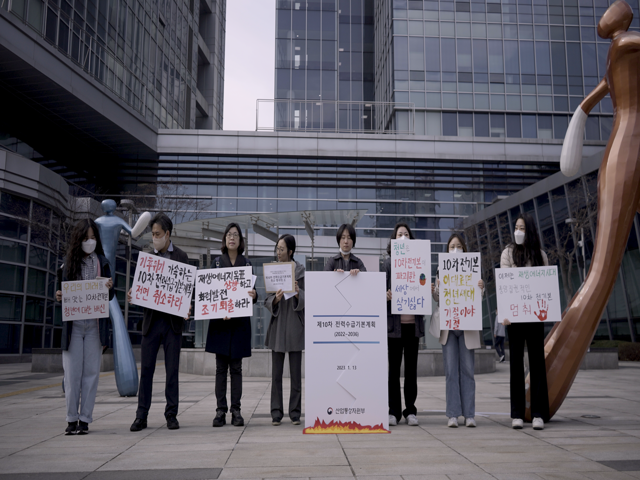Nine South Koreans have sued the government for backtracking on the country’s renewable energy commitment in the latest electricity plan.
The latest plan reduces target share for renewable energy in the market, contrary to its pledge to go carbon neutral by 2050.
The plaintiffs, entailing a small renewable energy business operator and individual citizens, filed for the revocation of the 10th Basic Plan of Long-Term Electricity Supply and Demand today at the Seoul Administrative Court. The plaintiffs are backed by 24 civic organizations, including a youth activism organization.
The latest lawsuit reflects increasing calls for the South Korean government to be more climate responsible. The plaintiffs, in particular, criticized the plan’s reduced target for the new and renewable energy’s share in the country’s energy market—from the previously pledged 30.2 percent to 21.6 percent by 2030.
“The plan goes against the global trend of achieving carbon neutrality and responding to the climate crisis” and violates the basic rights of future generations who have no say on the electricity plan, the plaintiffs said in the joint statement.
“For us to respond to the climate crisis and pass on our legacy to the future generations, the government must review the plan from square one and re-establish a plan that’s in line with its carbon neutrality goal,” said Sang-wan Shim, Chairman of Gyeongnam Sunlight Power Generation Co-op and one of the plaintiffs.
South Korea’s renewable energy industry already lags far behind that of other countries; compared to the global average of 10%, solar and wind share in Korea’s electricity generation is at 5%. However, the plan lowered the renewable energy portfolio standard (RPS), or the proportion of renewable energy generation required for larger power producers such as state-owned power generation companies, from 25% to 15% in 2026.
Companies that are not able to generate enough renewable energy to meet the RPS need to purchase energy from other renewable businesses. The reduced RPS directly affects the livelihood of renewable energy business owners, especially smaller companies that may be more financially affected by changes in the country’s energy plan.
Such drastic changes also highlight unpredictability in the country’s energy policy and contribute to greater instability in the renewable energy market.
The current electricity plan also reveals the government’s continued reliance on fossil fuel power plants. The plan aims to replace 28 aging coal-fired power plants with gas plants by 2036. Liquefied natural gas (LNG) releases toxic air pollutants when burned and is the one of major culprits for emitting methane—the second-largest contributor to global warming after carbon dioxide.
“This plan contradicts Jeju’s reality and is a result of the government’s centralized policy-making process,” criticized Jeong-do Kim, Director of Policy at Korea Federation for Environmental Movements’ Jeju Branch and another plaintiff of the case. While Jeju pledged to go carbon free by 2030, the latest plan includes Jeju as one of the sites to build a new LNG plant.
The latest revocation suit comes after the Ministry of Trade, Industry and Energy (MOTIE) confirmed the 10th electricity plan on January 12 without fully addressing the various concerns raised by the Ministry of Environment and experts in academia, industry, and civic organizations. The electricity plan, while updated every two years, will serve as the basis for how the current administration invests in energy infrastructure.
“Currently there is no procedural mechanism to ensure the independence, fairness, and transparency of the experts involved,” the plaintiffs said.
Similar concerns have been raised about Korea’s first framework plan for carbon neutrality with its draft still yet to be made public.
Dubbed the carbon neutrality roadmap, the framework plan should be established by March 25, as required by the Framework Act on Carbon Neutrality and Green Growth for Coping with Climate Crisis.
However, the framework plan will likely be based on the 10th electricity plan, stoking concerns of low renewable ambitions. The public hearing for the framework plan is scheduled for March 22, leaving a narrow window for feedback.

